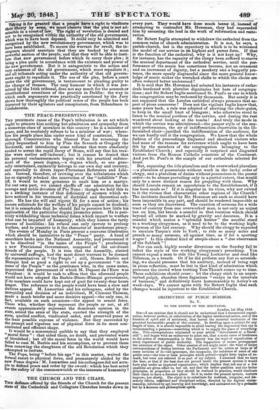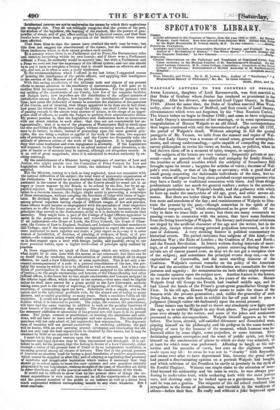OBSTRUCTION OF PUBLIC BUSINESS.
No. V.
TO THE EDITOR OF THE SPECTATOR.
London, 1st May 1848. SIR—I am anxious that it should not be understood that I recommend organi- zation, however perfect, in substitution of the higher intellectual action, and of the freedom of spirit and of sentiment, that leaven the material tendencies of the practical businesslike people of this country. In dwelling upon a subject for any length of time, it is almost impossible to avoid leaving the impression that one Is recommending a panacea—something which is to supply the place of everything else. This correspondence originated in your article "Government at a Stand- still"; and began with an endeavour to point out, that a main cause of hindrance to the action of statesmanship in this country was the want of organization of every department of public authority. The supposition of means presupposed the existence of the object. Other sources of evil might exist: the want of entire correspondence of feeling between the Parliament and the nation at large or of some sections of it—the ignorance, the incapacity, the indolence of some of our public men—the true or false principles which prevail—might form topics of re- mark, but were not referred to as part of my subject. I assumed that we have the best, or that if the best does not prevail under the present system it would have play under an improved organization; which implies that not one or a few qualities are given effect to, but all, and that the better qualities and the better principles, in proportion as they should be realized in practice, would vindicate their claim to have a foremost place. So it is, under the present system, matters improve, but slowly. The object is to substitute for mobbiah, irregular, and dis- orderly efforts, combined and disciplined action, directed by the highest etatee- mambip, informed by apt learning and knowledge, and animated not by a pedantic but by a humane and philosophical spirit.
Intellectual persons are apt to undervalue the means by which their aspirations are wrought out. They do not willingly recognize that the genius of the poet, the wisdom of the legislator, the learning of the student, like the powers of gun- powder, of steam, and of gas, effect nothing but byphysical means, and that their results have always been in the proportion of the facilities which those means have afforded.
That from time to time the means have overlaid the ends may be true; but this does not suggest the abandonment of the means, but the counteraction of those tendencies which in their excess produce such results.
In a country where there is no Parliament and no Press, the Bureaucracy rules and restricts everything within its own bounds; and if there were a Parliament without a Press, its authority would be scarcely less; but with a Parliament and a Press we need not fear the supremacy of the official system; and our aim should be to put it upon so complete a footing that it should become an effective aid and ally, and not, as it often is now, a costly hindrance.
In the recommendations which I offered in my last letter, I suggested means of insuring the intelligence of the public officers, and applying that intelligence to the service of the Minister and of the public.
With this saving recollection of the ultimate ends and objects of my present efforts to secure attention to the machinery of statesmanship, I will peas on to another field for improvement: I mean the Judicatures. For the present I will say nothing of the constituents of our Courts, how few of the requisite facilities our Judges hare; how imperfect are the distribution of the subject matters of jurisdiction among the Judges; how imperfect the distribution of business over time; how great the deficiency of means to ascertain the statistics of the operation of the Courts, and of insuring that things appointed to be done are in fact done; how great the fetters of form, how small the utility; nor shall I refer but by way of passing remark to the almost total absence of means, in the shape of an appro- priate staff of officers, to enable the Judges to perform their administrative duties. My present position is, that the Legislature and Judicatures have no intercourse with nor direct relation to each other; that they act not concurrently but an- tagonistically; that it is one of the pleasures of Westminster Hall to dwell upon the sins and follies of St. Stephen's Chapel, without rendering much, if any, assist- ance to do better; in short, instead of proceeding upon the same general prin- ciples, the one being a realizer or applier of the work of the other, two separate sets of principles are in constant action; and the Courts too frequently take the attitude of perverse critics of the work of the Legislature. It is impossible to deny that some hesitation and even repugnance is allowable. If the Legislature will transmit to the Courts puzzles to be solved instead of plain directions, a de- gree of banter or of sarcasm may be natural, although not altogether seemly. It IS an evil of great magnitude, since it is calculaW to weaken authority by ex- citing contempt
By the establishment of a Minister having cognizance of matters of Law and Justice, who might preside over the Committee of Privy Council for Law and Legislation referred to in a former letter, the deficiency would be in a degree supplied.
But the Minister, coming to a task so long neglected, must not encounter with the natural difficulties of his subject, the total want of systematic organization of the Judicatures. It would be at least desirable that the difficulties which are ex- perienced in the course of the practice of the Courts should be noted not in an angry or jocose manner by the Bench, to be echoed by the Bar, but by an ap- pointed reporter. By contributing their experience of the miscarriages of legis- lation in a decorous manner, the Judges might assist in preventing a recurrence of those miscarriages, without mingling the functions of judge with those of legis- lator. By dividing this labour of reporting upon difficulties and miscarriages, among several reporters having charge of different ranges of law and practice, those officers would become so impregnated with the spwlalties of their respective matters as to offer the fittest means of keeping legislation in harmony with the ciples that prevail in the Judicature; so far as it is desirable to maintain that ony. They might form a part of the College of Legal Officers appointed to assist in the preparation and revision and recording of legislative measures. If alljudicatures—the House of Lords, the Privy Council, the Court of Chan- serj, the Courts of Law in England, Scotland, and Ireland—furnished members to this College; and if the respective members appointed to report the same matter were instructed to meet together and make a joint report on it,—say it is some branch of jurisdiction, of doctrine, of pleading, of evidence, of form, or of pro- cadure,—the common action would elicit common principles, and gradually place us in that respect upon a level with foreign jurists, and possibly, owing to our more practical habits, upon a higher level—that of principle aptly realized by practice. In these suggestions we speak of those things which are within reach—of what might be at once done with the means at our command; but there can be no doubt that, for rendering the administration of justice through all its stages effective, we need a Law University, or some equivalent. This is not only a ne- °emery accompaniment of a code or a general consolidation of the law, but pro- bably the means by which it is to be effected as well as secured. Let it be a con- dition of participation in the magnificent treasure assigned to the administration ofiustice,—to the ample emoluments and honours of the Chancellorship and other judicial offices, to the lesser but no less ample emoluments and honours assignel to the inferior legal offices, which abound in our system,—that none shall be eligible unless he shall have served for a given period in the Law University, actually taking some part in the duty of reporting, of digesting, of writing, of revising, of recording, of commenting upon our laws. Substitute such a simple, and to the nation and to the individual profitable rule, for the absurd one of eating so many dinners, and so-called practising so many years. Such a condition fulfils all the requisites. It could not be performed without insuring in some degree the quali- fication which it is intended to provide. The judge, the counsel, the practitioner, will have had the same training in addition to such as the peculiar functions of their branch of the piefession may require. The student, in assisting in making the necessary additions or alterations of the general law, will learn it in its present state. The judge, counsel, or practitioner, on learning the alterations and addi- tions, will not have to learn new principles and new systems. The multitude of members will not only admit of, but require the best organization. The dogmatic form of teaching will not prevail exclusively. In recording additions, the past will be learnt, with an ever accruing present developing and illustrating the old. And not only may the best organization be obtained by this means, but it may be obtained by little or no expense to the state. I must not in this paper venture upon the detail of the means by which our legislative and legal systems may be thus regenerated and developed. It is suf- ficient to add, for the present, that the feeling in favour of a Law University, either through a union of the present Inns of Court or by an independent institution, is becoming general among all classes of lawyers. They find in the present pressure of business an absolute need for laying a good foundation of positive acquirement, which cannot be supplied in after life; and of allaying or regulating that pruriency of indefinite and inapplicable legislation which makes it necessary that they should go to school again to learn the new systems and new practices annually propounded by our Legielature,withoutthought of the past, of what they are doing in other directions, and of the practical results of the combination of the whole.
It would not be difficult to show that by the present state of things the na- tional expenditure is very much increased in all the departments of the state, and the general taxation of the public in an indirect as well as a direct form much augmented without corresponding benefit to any class whatever. But I























 Previous page
Previous page